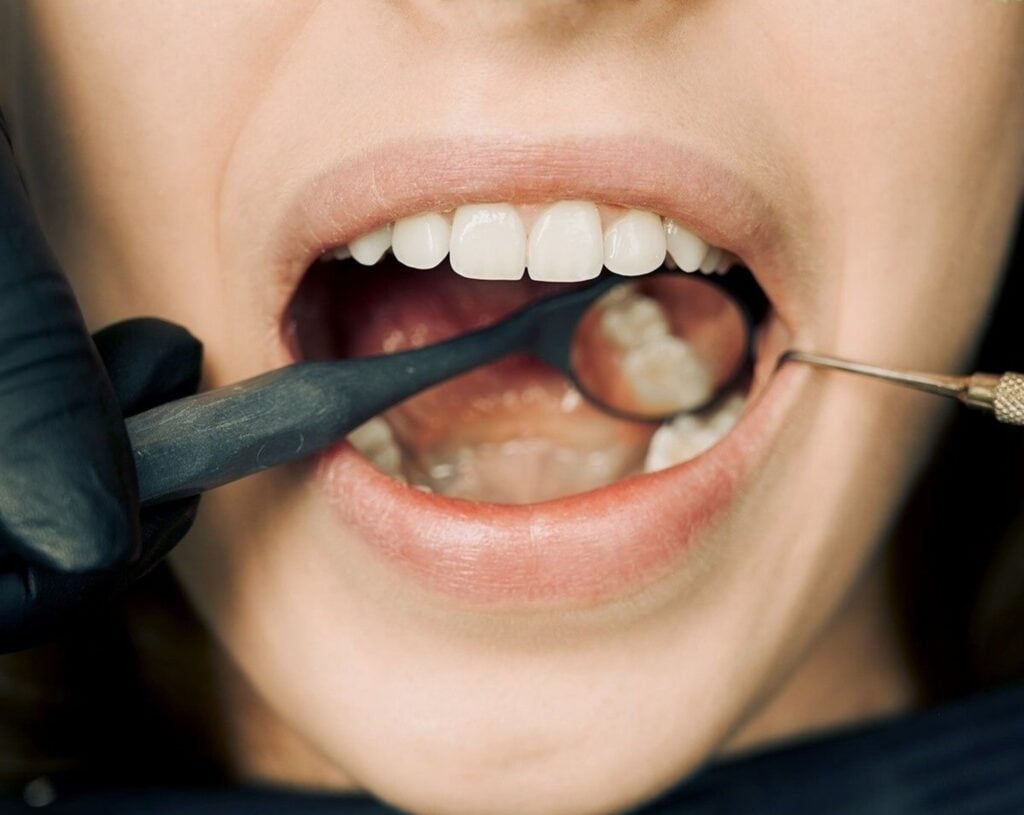Dealing with Tooth Sensitivity in Perth
Understanding tooth sensitivity is essential for those experiencing discomfort from hot or cold foods and beverages. This guide delves into the causes, prevention, and treatment of tooth sensitivity, offering insights for maintaining oral health and enjoying daily activities pain-free.

Common Causes of Teeth Sensitivity
Tooth sensitivity, also known as dentinal hypersensitivity, is a common dental condition characterized by discomfort or pain in the teeth when exposed to certain stimuli, such as hot, cold, sweet, or acidic foods and drinks. This sensitivity occurs when the tooth’s protective layers—enamel over the crown or cementum over the root—are worn down, exposing the dentin. Dentin is less dense than enamel and cementum and contains microscopic tubules that lead to the tooth’s nerve.
In some cases, tooth trauma, such as a crack, can also cause this discomfort. It’s crucial to maintain good oral health to prevent or reduce sensitivity. And, if you experience severe or sudden pain, it’s best to consult your Perth dentist immediately to address the issue effectively.
Enamel Erosion: Impact of acidic foods and drinks
Consuming lots of citrus fruits and other highly acidic foods can wear down your tooth enamel, the hard outer layer of your teeth. This erosion makes your teeth more prone to tooth sensitivity when you eat cold food or drink something hot.
To help reduce teeth sensitivity, try cutting down on acidic food and drink, and rinse your mouth with water after eating them. Not just citrus fruits but also other highly acidic and sweet foods can weaken your tooth enamel. Over time, this can lead to sensitive teeth. Switching to a diet with fewer acidic items and using a soft-bristled toothbrush can help in preventing tooth sensitivity.
Tooth Decay and Cavities: How they expose sensitive dentin
Tooth decay is often caused by poor oral hygiene and eating too many sugary foods. This decay can lead to cavities, exposing the sensitive dentin beneath your tooth enamel. This exposure is a major reason for experiencing tooth sensitivity. Regular brushing and avoiding sweet foods can keep decay at bay.
Cavities create tiny holes in your teeth, reaching down to the sensitive layers. Not only do they cause tooth sensitivity, but they can also lead to more serious dental problems if not treated. Visiting your South Perth dentist for regular check-ups can help spot tooth decay early and decrease tooth sensitivity.
Gum Recession: Link between exposed roots and sensitivity
When your gums recede, the roots of your teeth, which are not covered by hard enamel, get exposed. This exposure often leads to tooth sensitivity. Gentle brushing with a soft-bristled toothbrush can help protect your gum tissue and gum line.
Gum recession can be a sign of gum disease, and it exposes the more sensitive parts of your teeth. It can make eating hot or cold food uncomfortable. Maintaining good oral care and regular dental visits are key to preventing gum disease and related tooth sensitivity.
Brushing Techniques: Effects of aggressive brushing and hard-bristled toothbrushes
Aggressive brushing or using a hard-bristled toothbrush can damage your tooth surface and gum tissue, leading to tooth sensitivity. It’s better to use gentle pressure and a soft-bristled toothbrush to protect your teeth and gums.
Harsh brushing techniques and abrasive toothpaste can wear down tooth enamel and cause your gums to recede. This not only increases the risk of tooth sensitivity but can also lead to other dental problems. So, brush gently to keep your teeth and gums healthy.
Dental Procedures: Sensitivity post fillings, crowns, or whitening
After certain dental procedures like fillings, crowns, or teeth whitening, it’s common to experience some tooth sensitivity. It usually settles down after a few days. If you have teeth whitening sessions, talk to your dentist about products to reduce teeth sensitivity.
Sometimes, teeth sensitivity post-dental work can be due to the procedure itself or the healing process. If the sensitivity persists, it’s important to return to your dentist. They might recommend specific treatments or products, like alcohol-free mouthwash, to help decrease tooth sensitivity.
Bruxism: Consequences of teeth grinding
Teeth grinding, known as bruxism, can lead to tooth wear and increase tooth sensitivity. Many people grind their teeth at night without realising it. Wearing a mouthguard can help protect your teeth from the effects of grinding.
Regular teeth grinding puts a lot of pressure on your teeth, gradually wearing down the enamel. It can expose the sensitive layers underneath, leading to discomfort and tooth sensitivity. Seeing a dentist for a custom mouthguard can be a great step in preventing tooth sensitivity caused by bruxism.
Cracked Teeth: How they contribute to sensitive teeth
A cracked tooth can be a significant source of tooth sensitivity. Even a small crack can expose the inner, more sensitive layers of your tooth.
It’s important to see a dentist if you suspect you have cracked teeth to reduce teeth sensitivity and prevent further damage. Sometimes, a cracked tooth might not be visible but can cause pain when eating or drinking something hot or cold. Regular dental check-ups can help identify a cracked tooth early, preventing worsening of tooth sensitivity and other complications.
Plaque Build-Up: Its role in enamel erosion and gum disease
Plaque build-up can lead to enamel erosion and gum disease, both of which can cause tooth sensitivity. Good oral hygiene practices, like regular brushing and flossing, can help prevent plaque accumulation and protect your enamel.
If not removed, plaque can harden into tartar, which is much harder to clean and can aggravate gum disease. Regular dental cleanings can help remove tartar and keep your teeth and gums healthy, thus preventing tooth sensitivity.
Gum Disease: How periodontal issues expose tooth roots
Periodontal, or gum disease, can cause your gums to recede, exposing the roots of your teeth. This exposure often results in tooth sensitivity, especially to hot, cold, or sweet food. Maintaining good oral hygiene and regular dental visits can prevent gum disease.
Advanced gum disease not only affects your gums but also the bones that support your teeth. It can lead to increased teeth sensitivity and even tooth loss. Early detection and treatment are key in managing periodontal disease and its effects on tooth sensitivity.
Mouthwash and Whitening Products: Their potential to exacerbate tooth sensitivity
Some mouthwashes, especially those containing alcohol or whitening agents, can worsen tooth sensitivity. If you’re experiencing tooth sensitivity, try switching to an alcohol-free mouthwash designed for sensitive teeth.
Whitening strips and certain teeth whitening products can also increase tooth sensitivity. If you notice your teeth becoming more sensitive after using these products, it might be wise to take a break from them or discuss alternative options with your dentist to reduce tooth sensitivity.

Signs and Symptoms of Tooth Sensitivity
Recognizing the signs of tooth sensitivity is crucial for maintaining good oral health. Here are some common symptoms to watch for:
Sudden, Sharp Pain
The most common symptom of tooth sensitivity is a sudden, sharp pain when your teeth come into contact with cold foods or drinks. This reaction indicates that something may be wrong with your dental health.
Discomfort with Hot or Sweet Foods
Another tell-tale sign is discomfort when consuming hot beverages or sweet treats. This can worsen tooth sensitivity over time.
Dry Mouth
In some cases, tooth sensitivity is accompanied by a dry mouth. A lack of adequate saliva can lead to dental discomfort, as saliva plays a vital role in protecting your teeth from erosive foods and drinks.
Consistent Pain Responses
If you notice that certain foods or temperatures consistently trigger a pain response, it’s a clear indicator that your teeth are sensitive and need attention.
General Discomfort or Dull Ache
Tooth sensitivity can also manifest as a general discomfort or a dull ache in your teeth. This ongoing discomfort might not be as sharp as the reaction to cold foods, but it’s equally important to address.
These continuous pain signals could indicate underlying issues that, if left untreated, could lead to more severe oral health problems. Regular dental check-ups are essential to diagnose and manage tooth sensitivity effectively.
Home Care and Lifestyle Changes
Making some simple changes at home can go a long way in managing teeth sensitivity and preventing that sharp pain you feel with hot or cold foods. By being mindful of certain lifestyle habits, you can significantly improve your oral comfort.
Dietary Adjustments: Reducing acidic and sugary foods
One of the key steps in managing teeth sensitivity is to avoid acidic foods and drinks, as these can erode your tooth enamel. It’s not just about consuming acidic foods; sugary snacks and drinks can also lead to dental decay. By reducing your intake of these items, you can help prevent tooth sensitivity and maintain a healthier gum line.
Improved Dental Hygiene: Gentle brushing and flossing techniques
When it comes to brushing, using soft-bristled toothbrushes and brushing carefully with the proper technique can make a big difference. Aggressive brushing can wear down your enamel and irritate your gum line. Opting for soft bristles and gentle motions is a more effective way to clean your teeth without causing additional sensitivity.
Protective Toothpaste: Use of desensitising toothpaste
Switching to a desensitising toothpaste can help manage tooth sensitivity. These toothpastes often contain fluoride toothpaste, which helps strengthen tooth enamel and reduce discomfort. Regular use can provide a shield against sensitivity, especially when used in conjunction with a toothbrush with soft bristles.
Professional Dental Treatments for Tooth Sensitivity
Sometimes, home care might not be enough, and professional dental treatments become necessary. These treatments are designed to address the underlying causes of teeth sensitivity and provide long-lasting relief.
Fluoride Treatments: Strengthening enamel and dentin
Professional fluoride treatments are an effective way to strengthen your teeth’s enamel and dentin, helping to prevent tooth sensitivity. These treatments, offered by experienced dentists, can provide a more robust defence against everyday acids and sugars that contribute to teeth sensitivity.
Bonding, Crowns, or Inlays: Addressing physical tooth defects
For teeth that have physical damage or decay, treatments like bonding, crowns, or inlays can be beneficial. These medical procedures help restore the integrity of the tooth and protect the root surface from exposure, thereby reducing sensitivity. These dental fillings and restorations are customised to fit your teeth perfectly.
Surgical Gum Graft: Treating gum recession
Gum recession, which exposes the sensitive root of your teeth, can be treated with a surgical gum graft. This procedure involves taking tissue from one part of your mouth and attaching it to the areas where the gums have receded. It helps cover the exposed root surface and reduce sensitivity.
For those with severe dental anxiety, sleep dentistry may be a solution. It involves making the patient unconscious for the entire duration of the procedure.
Root Canal Treatment: A solution for severe cases
In severe cases of teeth sensitivity where other treatments aren’t effective, a root canal may be recommended. This procedure addresses the problem right at the source by removing the affected nerve tissue. It’s a more comprehensive solution for those experiencing persistent sharp pain in their teeth. Remember, visiting your dentist regularly is crucial for maintaining good oral health and managing any issues before they become more serious. Your dentist can guide you on the best course of action, whether it’s a change in your home care routine or more advanced treatments.
FAQs about Tooth Sensitivity
What lifestyle changes can help reduce tooth sensitivity?
Adopting a healthy diet low in acidic and sugary foods, using a soft-bristled toothbrush, practicing gentle brushing techniques, and avoiding aggressive dental care practices can help reduce tooth sensitivity.
Can stress affect tooth sensitivity?
Yes, stress can lead to habits like teeth grinding (bruxism), which can wear down enamel and increase tooth sensitivity. Managing stress through relaxation techniques or wearing a mouthguard at night can help.
How does dehydration impact tooth sensitivity?
Dehydration can reduce saliva production, which is essential for neutralizing acids and protecting teeth. Staying hydrated helps maintain saliva flow, reducing the risk of tooth sensitivity.
Are there specific dental products recommended for sensitive teeth?
Yes, using toothpaste formulated for sensitive teeth, fluoride mouthwashes, and soft-bristled toothbrushes can help manage and reduce tooth sensitivity.
How can I distinguish between tooth sensitivity and a cavity?
Tooth sensitivity typically occurs with exposure to hot, cold, or sweet stimuli, while cavities may cause a constant dull ache or sharp pain regardless of temperature changes. A dentist can provide a definitive diagnosis.
What role does saliva play in preventing tooth sensitivity?
Saliva helps neutralize acids, wash away food particles, and remineralize enamel. A healthy flow of saliva is crucial for protecting teeth from sensitivity and decay.
Can orthodontic treatments cause tooth sensitivity?
Orthodontic treatments, such as braces or clear aligners, can sometimes cause temporary tooth sensitivity due to tooth movement and adjustments. This usually subsides as the teeth adjust to the changes.
How effective are over-the-counter treatments for tooth sensitivity?
Over-the-counter treatments like desensitizing toothpaste can be effective for mild to moderate sensitivity. However, persistent sensitivity should be evaluated by a dentist for more targeted treatment options.
Is there a link between tooth sensitivity and other health conditions?
Certain health conditions, such as GERD (acid reflux) and diabetes, can affect oral health and contribute to tooth sensitivity. Managing these conditions can help reduce dental discomfort.
How often should I visit the dentist if I have sensitive teeth?
Regular dental visits, typically every six months, are important for monitoring and managing tooth sensitivity. Your dentist can provide personalised care and preventive treatments to help reduce sensitivity.

Let’s Tackle Tooth Sensitivity Together!
Are you tired of wincing from the sharp pain of sensitive teeth? It’s time to say goodbye to discomfort and hello to confident eating and drinking! At Acts Dental, we specialise in understanding and treating tooth sensitivity.
Our caring and professional team is ready to provide you with the best solutions, from gentle cleaning techniques to advanced treatment options.
Our other services include, emergency dental services, wisdom tooth removal in Perth, check up and clean, dental implants, and other oral health care services.
Acts Dental is also proud to be a Medibank preferred provider, HBF preferred provider, HCF preferred provider, NIB preferred provider, and Bupa preferred provider dentist in Perth.
Call us on (08) 9474 5083 if you need a thorough check up.


